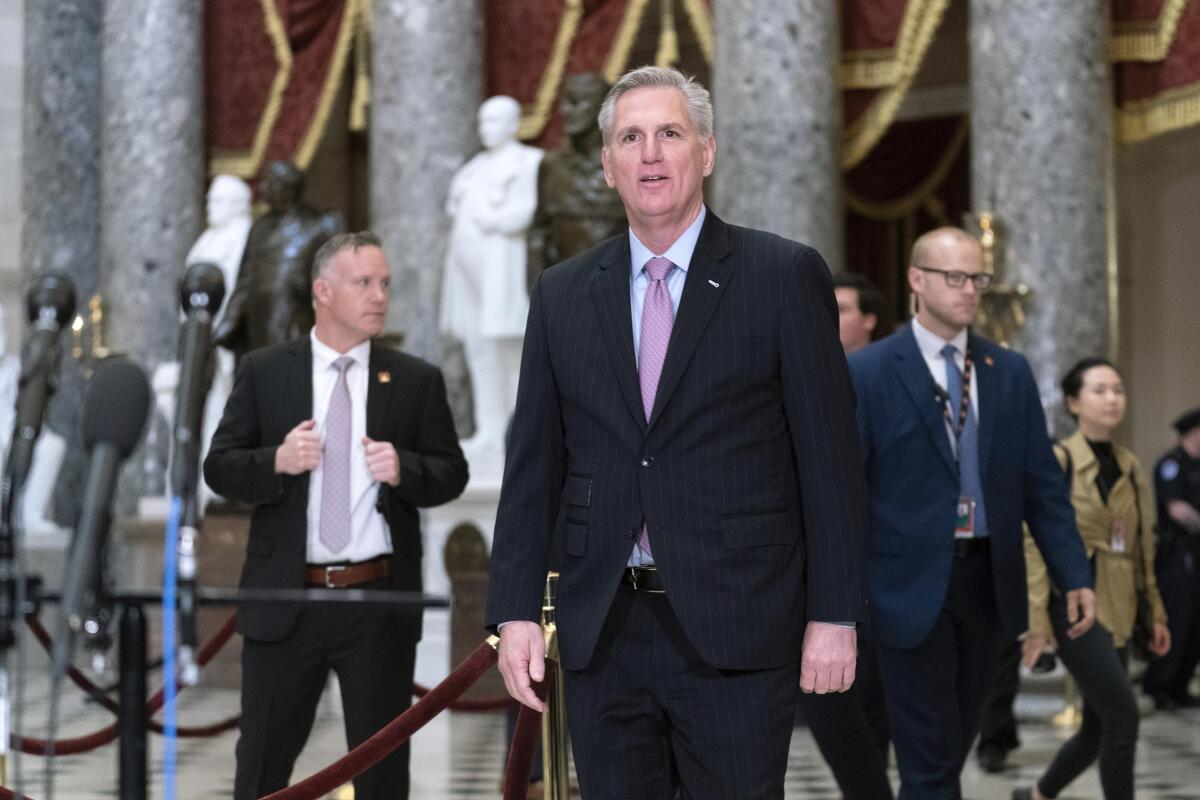Column: GOP’s deficit reduction is a cynical performative gesture

- Share via
For several years now, I’ve been told that the old consensus of fiscal conservatism and limited government was dead. So, you might think I’m delighted by the sudden rebirth of tea party-style budget-cutting zeal on display in the GOP’s brinksmanship over the debt ceiling.
Not so much.
I’ll get to the debt ceiling fight, but first let’s take a moment to consider Mitch Daniels, the former Indiana governor rumored to be contemplating a Senate run in 2024.
Daniels was perhaps the most successful and adroit budget cutter of our lifetimes, both as governor and as president of Purdue University.
When Daniels left his job at Eli Lilly to become governor in 2005, Indiana was plagued by debt and deficits. He left the state with a triple-A credit rating and a $2-billion rainy day fund. When he took over at Purdue, the school had raised tuition every year for 36 consecutive years. He froze tuition at under $10,000 for a decade — while raising revenue. This was amid an era of exploding tuition increases at public universities (134% since 2003).
But last week, the Club for Growth, which markets itself as a leading defender of limited government and economic conservatism, attacked him for even thinking of running for Senate. “After 50 years of big government, big pharma and big academia, Mitch Daniels forgot how to fight,” the group declared in an ad.
I guess it depends on what you mean by fighting.
For Trumpified institutions like the Club for Growth, fighting is defined as performative pugnaciousness. The House Freedom Caucus, the tail that wags the dog of Speaker Kevin McCarthy’s Republican conference, is such an institution.
In his struggle to become speaker, McCarthy (R-Bakersfield) reportedly made a commitment to hold up an increase in the debt ceiling in exchange for spending cuts from the Democrats. The deadline comes this week. If the limit isn’t raised, the government will start running out of cash and the prospect of a debt default will rattle the American and global economy.
“If you had a child, you gave them a credit card, and they kept hitting the limit, you wouldn’t just keep increasing it,” McCarthy said on Sunday. “You’d first see what you’re spending your money on. How can we cut items out?”
That sounds right and I’d love it if the GOP’s gambit were successful. But the first problem with the analogy is that you’d still have to pay your credit card bill for money you already spent. The time to cut spending is when you’re spending. The second problem is that the gambit isn’t really about spending.
Republicans — rightly! — opposed the Democrats’ lame-duck massive $1.7-trillion omnibus bill last month. But in every year of Trump’s presidency, Republicans approved trillion-dollar-plus omnibus spending bills. And that’s excluding all that lavish COVID spending. He paid for the MAGA agenda with America’s credit card.
It’s almost like these new deficit hawks aren’t opposed to racking up debt, they just want to be the ones doing it.
In 2021, Mick Mulvaney, one of the founders of the House Freedom Caucus, explained in an interview the group’s real motivations. Early in his presidency Trump worried that the Freedom Caucus would be a thorn in his side. But Mulvaney, a former acting chief of staff in the Trump White House, said he advised Trump that the group was actually his base because “at the core the Freedom Caucus is anti-establishment.”
According to Mulvaney, the Freedom Caucus abandoned fiscal conservatism because with Trump in office “the Freedom Caucus sort of moved to front and center on Fox News” and “they realized that there’s a lot more energy behind being nutjobs than there is being reasonable.”
In other words, when being fiscally conservative is rebellious and disruptive, they’ll strap on their green eyeshades. But when one of their leaders is in power, out comes the credit card.
This anti-establishment ethos was on full display in McCarthy’s struggle to become House speaker and it explains the virulent opposition to helping Ukraine. But it’s also come to define what it means to be a conservative in good standing among many primary voters as well as small and large donors and the institutions that rely upon them.
The New Left rebel spirit of the 1960s, which held that pragmatic progress was evidence of “selling out,” is alive and well in the New Right of the 2020s.
In this climate, the real rebels are going to be people, like Mitch Daniels, who actually want to accomplish something.
More to Read
A cure for the common opinion
Get thought-provoking perspectives with our weekly newsletter.
You may occasionally receive promotional content from the Los Angeles Times.











